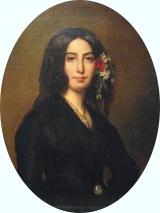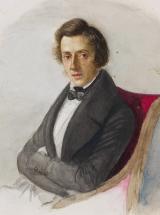Ki randizott George Sand-szel?
Alfred de Musset George Sand dátummal kelt, ? és ?. között A korkülönbség 6 hónapig és 5 napig tartott volt.
Félicien Mallefille George Sand dátummal kelt, ? és ?. között A korkülönbség 8 hónapig és 10 napig tartott volt.
Victor Borie George Sand dátummal kelt, ? és ?. között A korkülönbség 14 hónapig és 2 napig tartott volt.
Alexandre Manceau George Sand dátummal kelt, ? és ?. között A korkülönbség 12 hónapig és 10 napig tartott volt.
Prosper Mérimée George Sand dátummal kelt, ? és ?. között A korkülönbség 0 hónapig és 9 napig tartott volt.
Jules Sandeau George Sand dátummal kelt, ? és ?. között A korkülönbség 6 hónapig és 7 napig tartott volt.
Michel de Bourges George Sand dátummal kelt, és . között A korkülönbség 6 hónapig és 8 napig tartott volt.
Frédéric Chopin George Sand dátummal kelt, és . között A korkülönbség 5 hónapig és 8 napig tartott volt.
George Sand

Amandine Aurore Lucile Dupin, Baronne Dudevant (Párizs, 1804. július 1. – Nohant-Vic, 1876. június 8.) írói álnevén George Sand (kiejtése kb. „Zsorzs Szand”, a „d” nem néma) francia írónő, regényíró, dramaturg, újságíró, irodalomkritikus.
Bővebben...Alfred de Musset

Alfred de Musset (Párizs, 1810. december 11. – Párizs, 1857. május 2.) francia költő, drámaíró, a francia romantika kiemelkedő képviselője. A Victor Hugo köré csoportosult költők közül az egyik legjelentősebb. Magyar vonatkozású műve: Barberine rokkája (1835).
Bővebben...George Sand

Félicien Mallefille

Jean Pierre Félicien Mallefille (May 3, 1813 – November 24, 1868) was a French novelist and playwright.
Mallefille was born in Mauritius. He wrote a number of plays, including Glenarvon (1835), Les sept enfants de Lara (1836), Le cœur et la dot (1852), and Les sceptiques (1867), as well as two comedies, and two novels, Le collier (1845) and La confession du Gaucho (1868). A farce of his, Les deux veuves, later formed the basis of the libretto for Bedřich Smetana's opera The Two Widows.
He also wrote a scenario in French that was to have been the basis of a libretto for the opera Sardanapalo by Franz Liszt, but delivered it so late that Liszt, angered at his unreliability, had commissioned an Italian libretto from another writer; in the end the opera was never completed.
Mallefille also had a relationship with George Sand.
Bővebben...George Sand

Victor Borie

Victor Borie, né le à Tulle et mort le à Paris 6e, est un journaliste français.
Bővebben...George Sand

Alexandre Manceau

Alexandre Manceau, né à Trappes le et mort à Palaiseau le , est un graveur et auteur dramatique français.
Bővebben...George Sand

Prosper Mérimée

Prosper Mérimée (Párizs, 1803. szeptember 28. – Cannes, 1870. szeptember 23.) francia elbeszélő, regényíró, művészettörténész, régész, az Académie des inscriptions et belles-lettres tagja. Leginkább Carmen című elbeszéléséről ismert, amely alapjául szolgált Georges Bizet híres operájának.
Bővebben...George Sand

Jules Sandeau

Jules Sandeau ejtsd: szandó (Aubusson, 1811. február 18. – Párizs, 1883. április 24.) francia író.
Bővebben...George Sand

Michel de Bourges

Louis-Chrysostome Michel, dit Michel de Bourges, né à Pourrières (Var) en 1797 et mort à Montpellier en 1853, est un avocat et homme politique français.
Bővebben...George Sand

Frédéric Chopin

Frédéric François Chopin (born Fryderyk Franciszek Chopin; 1 March 1810 – 17 October 1849) was a Polish composer and virtuoso pianist of the Romantic period who wrote primarily for solo piano. He has maintained worldwide renown as a leading composer of his era whose "poetic genius was based on a professional technique that was without equal in his generation".
Chopin was born in Żelazowa Wola and grew up in Warsaw, which in 1815 became part of Congress Poland. A child prodigy, he completed his musical education and composed his early works in Warsaw before leaving Poland at age 20, less than a month before the outbreak of the November 1830 Uprising; at 21, he settled in Paris. Thereafter he gave only 30 public performances, preferring the more intimate atmosphere of the salon. He supported himself, selling his compositions and giving piano lessons, for which he was in high demand. Chopin formed a friendship with Franz Liszt and was admired by many musical contemporaries, including Robert Schumann. After a failed engagement to Maria Wodzińska from 1836 to 1837, he maintained an often troubled relationship with the French writer Aurore Dupin (known by her pen name George Sand). A brief and unhappy visit to Mallorca with Sand in 1838–39 proved one of his most productive periods of composition. In his final years he was supported financially by his admirer Jane Stirling. In poor health most of his life, Chopin died in Paris in 1849 at age 39.
All of Chopin's compositions feature the piano. Most are for solo piano, though he also wrote two piano concertos before leaving Warsaw, some chamber music, and 19 songs set to Polish lyrics. His piano pieces are technically demanding and expanded the limits of the instrument; his own performances were noted for their nuance and sensitivity. Chopin's major piano works include mazurkas, waltzes, nocturnes, polonaises, the instrumental ballade (which Chopin created as an instrumental genre), études, impromptus, scherzi, preludes, and sonatas, some published only posthumously. Among the influences on his style of composition were Polish folk music, the classical tradition of Mozart and Schubert, and the atmosphere of the Paris salons, of which he was a frequent guest. His innovations in style, harmony, and musical form, and his association of music with nationalism, were influential throughout and after the late Romantic period.
Chopin's music, his status as one of music's earliest celebrities, his indirect association with political insurrection, his high-profile love life, and his early death have made him a leading symbol of the Romantic era. His works remain popular, and he has been the subject of numerous films and biographies of varying historical fidelity. Among his many memorials is the Fryderyk Chopin Institute, which was created by the Polish parliament to research and promote his life and works, and which hosts the prestigious International Chopin Piano Competition, devoted entirely to his works.
Bővebben...